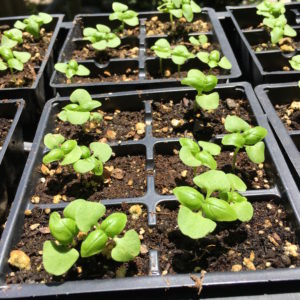PATIENCE IS A VIRTUE
Growing food takes time. No matter how perfect the soil is and how bright the sun is shining, plants are on their own schedule. This basil takes 80 days from seed to harvest, it takes 10 days just for the seeds to germinate.
These days both kids and grown ups are used to immediate gratification. Gardening operates on a much slower schedule. Kids get an opportunity to learn patience and delayed gratification when watching, weeding, watering and waiting for their flowers and vegetables to grow. Reading the seed packet to see how many days to harvest is a good way to plan. Use a calendar to count out the days, you can mark a potential harvest date and see how close you come to the predicted time frame.
 Back, in the 60’s and 70’s a series of famous Marshmallow experiments with preschoolers tested patience and delayed gratification. Kids were given a simple choice: one treat right now or more treats later if they waited. In follow-up studies, the researchers found that children who were able to wait longer for the rewards tended to be more successful in life. Those preschoolers who could successfully delay gratification ended up being the ones with higher test scores, lower levels of substance abuse, lower likelihood of obesity, better responses to stress, better social skills as reported by their parents.
Back, in the 60’s and 70’s a series of famous Marshmallow experiments with preschoolers tested patience and delayed gratification. Kids were given a simple choice: one treat right now or more treats later if they waited. In follow-up studies, the researchers found that children who were able to wait longer for the rewards tended to be more successful in life. Those preschoolers who could successfully delay gratification ended up being the ones with higher test scores, lower levels of substance abuse, lower likelihood of obesity, better responses to stress, better social skills as reported by their parents.
Can growing food help cultivate this ability to wait? I’d like to think it can.

